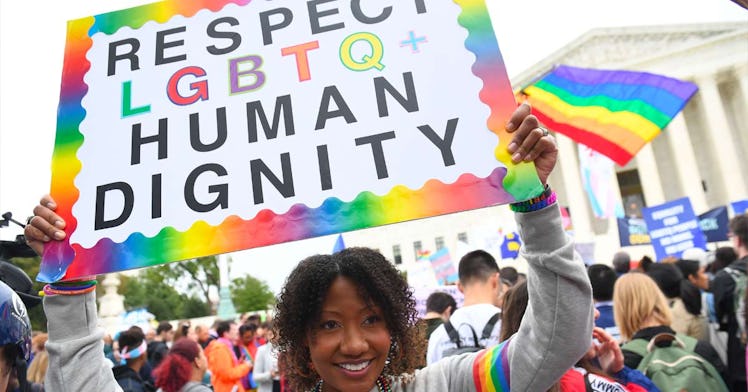Here’s What The Equality Act Would Do For LGBTQ+ Families — And If It Will Pass
The House is voting on the Equality Act (again) today. Here's what it means for families.

On Thursday, February 25, the House of Representatives will likely pass the Equality Act, a piece of legislation that would expand federal civil rights laws to also protect LGBTQ+ Americans.
The law would prohibit discrimination not only on the basis of sex, but also sexual orientation and gender identity. It’s a bill that has been on the radar since at least 2015, when Representative David Cicilline, a Democrat from Rhode Island, first introduced it and has done so in each legislative session since. It even passed the House in 2019 but died in the Senate.The bill was one that President Biden campaigned on while running for President, and the renewed focus on it in the House, Senate, and from the administration is a sign that the bill might have a brighter future than it’s had over the past 7 years. It would immediately enact federal protections for LGBTQ+ people in 27 states that don’t have any set in stone.
Here is, in short, what the Equality Act would do for American families:
- It would amend the 1964 Civil Rights act to include protections for LGBTQ+ Americans to protect them from discrimination on the basis of their sexual orientation and/or gender identity.
- The Civil Rights Act focused largely on anti-discrimination protection when it came to employment and housing. The Equality Act would go further than the CRA by expanding protections to public accommodations and federally funded programs. Stores, sports stadiums, online retailers, transportation providers, and private businesses would all be a part of the Equality Act. Protected groups under the Civil Rights Act would also be protected (racial and religious groups).
- It would take precedence over a 1993 law, the Religious Freedom Restoration Act, that made it harder for the government to enact laws if those laws “infringed upon religious freedom.”
Basically, it would be like the Civil Rights Act, which dramatically expanded civil protections for Black people and people of color after decades of organizing. That landmark legislation would simply be updated to be more expansive, helping LGBTQ+ kids move freely through schools, in public, and at private businesses, and helping their LGBTQ+ parents do so, too. It would be illegal for people to be fired for being LGBTQ+ or for being turned away at businesses for their identity. It is a wonder we don’t have the protections yet — and this bill could change that.
And, because it is a federal law, it would force 27 states to extend Civil Rights Act protections to LGBTQ+ Americans. That’s right: The majority of states do not have protections for LGBTQ+ people in place.
Why Are People Against the Equality Act?
It would expand the federal protections so much that there has been strong Republican opposition to the bill — critics fear the law would inhibit “religious freedom,” especially because it will take precedence over the RFRA.Will The Equality Act Pass And Become Law?Once again, the fate of the Equality Act is unclear. While it’s expected to pass the House with flying colors today, the fate of the bill in the Senate is murky. It needs to pass a filibuster-proof majority in the Senate, and right now, the vast majority of Senate Republicans have signaled they don’t support it.Republicans have signaled their belief that the bill infringes upon religious liberty (subtext: to discriminate against others and withhold services from them based on their own religious beliefs). But it appears to have full Democratic support, even from the most moderate Democrats like Kyrsten Sinema and Joe Manchin of Arizona and West Virginia, respectively. It would only need to pick up 9 more votes — with VP Kamala Harris’s vote — in order to pass.
This article was originally published on